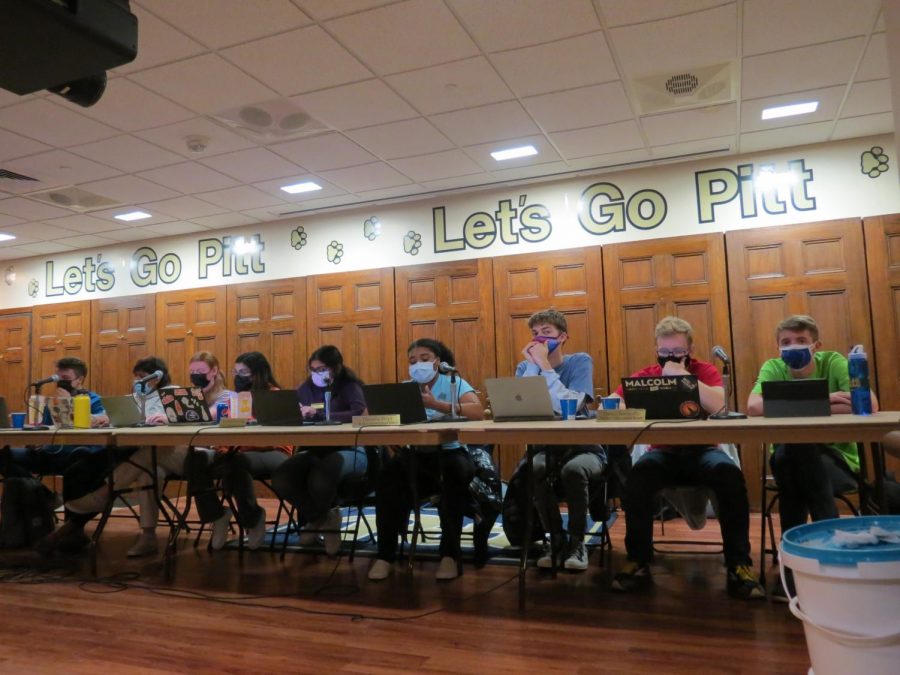Elections code changes aim to prevent repeat of chaotic 2021 election
Rachhana Baliga | Staff Photographer
Student Government Board at its weekly meeting in Nordy’s Place on Nov. 9.
February 2, 2022
The Vision slate’s disqualification less than three hours before last year’s Student Government Board election left many students confused and outraged. Stephen Jacobus, who chairs the board’s judicial committee, believes the lack of public communication about the decision led people to believe it was not made properly.
“A lot of people weren’t properly informed of why the decision was made or how it was reached or the process that actually led up to making that decision,” Jacobus, a senior political science major, said. “So it just seemed sort of arbitrary that a group of, you know, seven people got together and said, ‘Joe [Landsittel] and his campaign aren’t allowed to run anymore.’”
In the wake of the election, SGB established the Elections Procedure Review Task Force to review the events leading up to election day and gather feedback on SGB’s elections code and procedures. Using the feedback gathered by the task force, Jacobus said this year’s elections committee drafted updates to the elections code, which will take effect next spring.
“It’s not going to go into effect for this year’s election, regardless of when we get it passed, just because there’s rules about when you can pass updates to the current election,” Jacobus said. “We want to take our time and make sure we get it passed well. We don’t want to pass a half baked version that’s just going to have to get fixed next year.”
According to Jacobus, many students claimed in their feedback that the elections committee’s decision to disqualify the slate was biased. Jacobus said although “there was no bias” in the decision, it could appear otherwise to those unfamiliar with the process.
“It being this nebulous procedure definitely makes it seem like we were some clandestine group trying to rig the election,” Jacobus said. “Having participated in it, I can say without a doubt that there was no bias towards any individual people.”
Jacobus said the updated code will establish an “investigation panel” with three students unaffiliated with the elections and judicial committees in order to reduce the possibility of bias in future elections. The panel would take the place of the elections committee during investigations of elections code complaints.
According to Jacobus, the panel will also serve to “keep candidates away from each other” when processing complaints.
“Anyone can lodge a complaint if they believe something has been done incorrectly during the election,” Jacobus said. “And usually, it happens to be other candidates or other people involved in the election simply because they’re the ones who are seeing most of what happens.”
The investigation panel would speak on behalf of the complaint in elections committee hearings, rather than having the candidate who filed it speaking on behalf of the complaint. This is to ensure that “we don’t have candidates in the same hearing arguing over something,” according to Jacobus.
Determining which students will serve on the investigations panel remains a challenge, according to Marcus Edelstein, chair of the elections committee.
“How do we figure out who these three people are going to be? If we don’t do it, what else should we do?” Edelstein, a senior statistics major, said. “We got to figure out a way to keep it non-biased.”
According to Edelstein, removing disqualification as a punishment was another suggestion that several students included in their feedback for the task force.
“I don’t want any candidates to be disqualified,” Edelstein said. “And a lot of Pitt students were like, ‘You need to get rid of that immediately,’ but the biggest concern that my committee kept telling me, if we get rid of that, [candidates] can do the craziest stuff and get away with it.”
According to Edelstein, the committee decided to add language to the code specifying disqualification should be reserved for conduct which “explicitly threatens the health or well-being of students and the viability of the election.”
Edelstein said besides using the task force’s feedback, he worked with both Landsittel and Tyler Viljaste — last year’s two presidential candidates who ran as part of a slate, and this year’s presidential co-chiefs of staff — in drafting the code changes. Viljaste declined to comment but Landsittel, a member of the Vision slate, said he worked with Edelstein “to ensure key changes were included.”
“I trust that Marcus cares deeply about this work, and that the board appreciates the need for immediate change,” Landsittel said.
According to Jacobus, SGB will vote on whether to approve the changes to the code “hopefully sometime in the first couple public meetings.” Landsittel said he is looking forward to seeing the code revisions pass and is optimistic that they will benefit candidates during the elections process.
“Once implemented, these changes will drastically smoothen the elections process. The time of the candidates will no longer be wasted in politically motivated, convoluted hearings,” Landsittel said.
Jacobus said he hopes the changes will help students feel “comfortable and safe” reporting an election code violation.
“There have already been talks just with people we’ve spoken to that people don’t want to report violations because they don’t want to go through the circus that happened in the last election,” Jacobus said. “So I want to do my best to reassure people that we have learned from our mistakes.”



